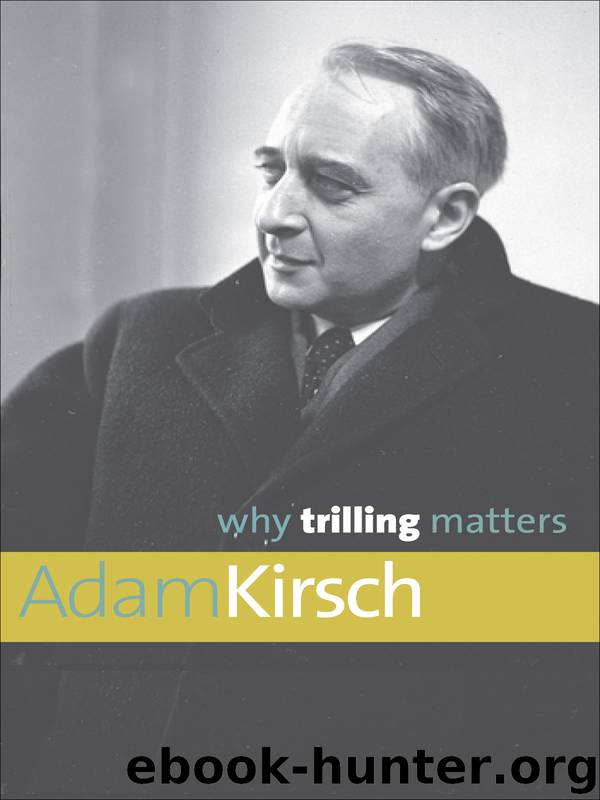Why Trilling Matters by Adam Kirsch

Author:Adam Kirsch
Language: eng
Format: epub
Publisher: Yale University Press
Published: 2011-03-14T16:00:00+00:00
6
“howl” and the visionary gleam
If Wordsworth, for Trilling, represents the wisdom of passiveness, then the poet who best represents the modern desire for rebellion and unmasking, for the transvaluation of social and aesthetic values, is William Blake. Blake’s “Proverbs of Hell” is the classic example, in English literature, of “insult offered to the prevailing morality” in the name of a more primal truth:
The road of excess leads to the palace of wisdom.
If the fool would persist in his folly he would become wise.
The soul of sweet delight can never be defiled.
Sooner murder an infant in its cradle than nurse unacted desires.
This antinomianism, Trilling says in “Wordsworth and the Rabbis,” is what makes Blake typical of “the quality of the militancy of most modern writers.” “Nothing is better established in our literary life than the knowledge that the tigers of wrath are to be preferred to the horses of instruction, a striking remark which is indeed sometimes very true, although not always,” he says of Blake’s famous aphorism. Trilling never devoted a full essay to Blake, but he mentions him on several occasions as a tutelary genius of the modern age—“the outraged spirit of William Blake, in whose existence we all now participate.” Trilling considered him a particularly important influence on the counterculture of the 1960s: “American undergraduates seem to be ever more alienated from the general body of English literature, but they had for some time made an exception of William Blake, pledging him their unquestioning allegiance, and in 1968, when the large majority of the students at my university were either committed to or acquiescent in its disruption, they found him uniquely relevant to their spiritual aspirations.”
In fact, by a strangely ironic chance, Trilling himself was a mentor to the poet who did most to transmit Blake’s legacy to the 1960s. In 1944, as a seventeen-year-old freshman, Allen Ginsberg signed up for Trilling’s course on the Great Books at Columbia, and soon became close to his professor. During the war years, the college was overloaded with officer training candidates, most of whom had no real interest in Trilling’s thoughts on the Great Books; in Ginsberg, on the other hand, he found a student who was already an aspiring writer. Ginsberg also later suggested that “I was probably closest to Trilling because we were both Jewish and he sort of empathized with me.”
Ginsberg sorely tested the limits of that empathy. He visited Trilling at home and sent him long letters; he even showed Trilling the poems he was writing, which he was afraid to do with his father, Louis Ginsberg, who wrote conventional magazine verse. Ginsberg told Trilling that “my father and I differ so violently on poetic method that I hesitate to ask him for advice and criticism”; in other words, he was asking Trilling to serve in his father’s place. But even this wasn’t enough, and in 1947, he sent Trilling a letter saying that he was trying to write “fully and directly enough to break down—what is it? Our mutual distrust.
Download
This site does not store any files on its server. We only index and link to content provided by other sites. Please contact the content providers to delete copyright contents if any and email us, we'll remove relevant links or contents immediately.
| African | Asian |
| Australian & Oceanian | Canadian |
| Caribbean & Latin American | European |
| Jewish | Middle Eastern |
| Russian | United States |
4 3 2 1: A Novel by Paul Auster(12392)
The handmaid's tale by Margaret Atwood(7763)
Giovanni's Room by James Baldwin(7346)
Asking the Right Questions: A Guide to Critical Thinking by M. Neil Browne & Stuart M. Keeley(5775)
Big Magic: Creative Living Beyond Fear by Elizabeth Gilbert(5771)
Ego Is the Enemy by Ryan Holiday(5447)
The Body: A Guide for Occupants by Bill Bryson(5096)
On Writing A Memoir of the Craft by Stephen King(4943)
Ken Follett - World without end by Ken Follett(4731)
Adulting by Kelly Williams Brown(4574)
Bluets by Maggie Nelson(4556)
Eat That Frog! by Brian Tracy(4540)
Guilty Pleasures by Laurell K Hamilton(4448)
The Poetry of Pablo Neruda by Pablo Neruda(4106)
Alive: The Story of the Andes Survivors by Piers Paul Read(4031)
White Noise - A Novel by Don DeLillo(4009)
Fingerprints of the Gods by Graham Hancock(4004)
The Book of Joy by Dalai Lama(3986)
The Bookshop by Penelope Fitzgerald(3852)
